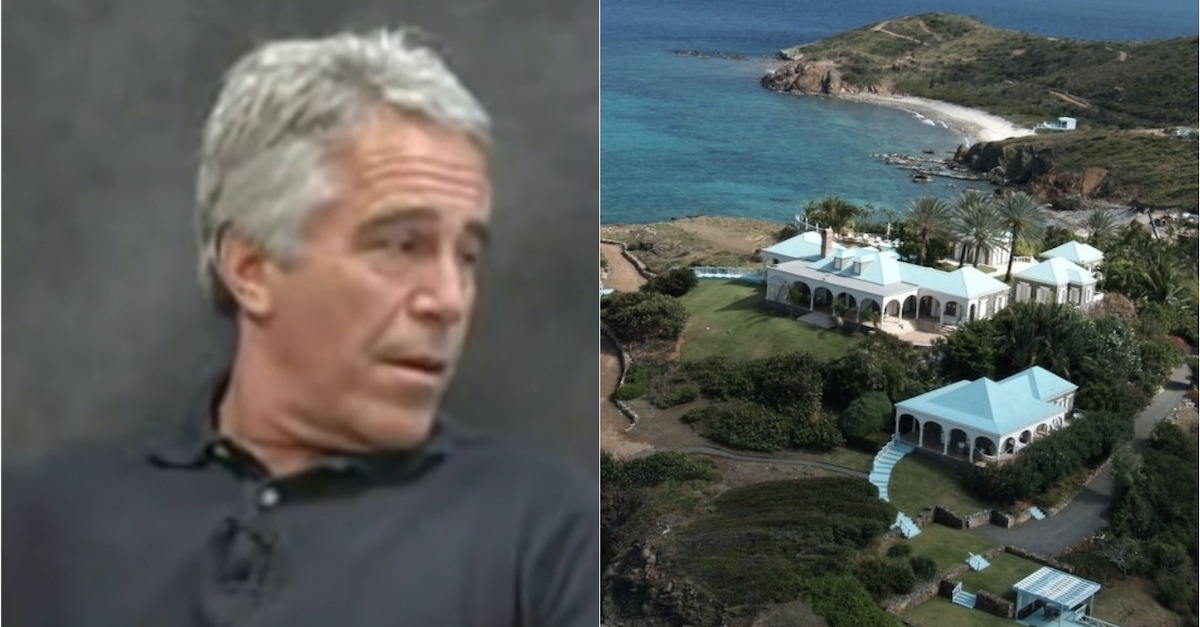
Jeffrey Epstein and Virgin Islands (Screenshot via deposition; Photo via DOJ)
Now that JPMorgan Chase has reached a $290 million settlement with Jeffrey Epstein survivors, the bank still has much more left to do before putting potential sex-trafficking liabilities behind them.
JPMorgan first must persuade a federal judge that the settlement is fair — and then, they still must contend with a similar case filed by the Virgin Islands government.
On Monday, attorneys for the survivors announced a deal to resolve allegations that JPMorgan knowingly profited from Epstein's sexual abuse of hundreds of young women and girls. The bank counted Epstein as a client from 1998 through 2013, some five years after the wealthy sex offender's guilty plea to soliciting prostitution from a minor.
'JPMorgan either knew or should have known'
Filed late last year, the class action lawsuit was led by a woman proceeding anonymously under the name of Jane Doe, who was represented by prominent attorneys in the Epstein saga such as Bradley Edwards, David Boies, and Sigrid McCawley. The parties announced their deal the day that a federal judge granted class certification to the survivors, noting that JPMorgan itself estimated that 137 people applied to the Epstein Victims Compensation Program (EVCP).
Though JPMorgan argued that far fewer people plausibly could have been affected by their conduct, Senior U.S. District Judge Jed Rakoff found that group would still have been large.
"The bank's own suspicions regarding these activities and reports suggest that JPMorgan either knew or should have known that Jeffrey Epstein operated a sex-trafficking venture perhaps as early as 2002," Rakoff's ruling states. "And if the class period extends to 2002, information from the EVCP suggests that the proposed class contains well over 100 people."
Since class action lawsuits require court approval, Rakoff set the stage for a so-called fairness hearing on June 26, 2023, when the survivors will have an opportunity to tell the court whether the settlement will make them whole.
In May, Deutsche Bank entered into a similar though smaller settlement with Epstein victims: $75 million. The terms of the Deutsche deal are public. JPMorgan's proposed settlement is not, and former sex trafficking prosecutor Mitchell Epner advised court-watchers to keep a close eye on the fine print.
"The next steps will be sending information about the proposed settlement to class members, in preparation for a hearing," said Epner, who once led intake for sex-trafficking cases in the U.S. District of New Jersey and is now a partner at Rottenberg Lipman Rich PC. "The settlement may allow individuals to opt out. That is governed by the agreement."
If the settlement allows for individuals to opt out, Epner told Law&Crime, other Epstein victims may file separate lawsuits. It is unclear whether the deal allows for that possibility.
JPMorgan representatives did not immediately respond to emails requesting comment.
'Unlawfully provided and pulled the levers'
For JPMorgan, another thread still remains to be tied: the lawsuit filed late last year by the U.S. Virgin Islands.
Within days of filing the lawsuit in December, then-Virgin Islands AG Denise George lost her job for undisclosed reasons. Her successors have since taken up the case, and JPMorgan has been trying to ratchet up the price of the litigation for the government ever since.
In late May, JPMorgan tried to turn the tables on the Virgin Islands by claiming that the government, not the bank, was "complicit" in Epstein's predatory lifestyle. It has released embarrassing information ever since about the territory's politicians, governors and other officials.
The Virgin Islands, for its part, argues that there is no equating the government and the bank's conduct.
"Discovery confirms that JPMorgan knowingly, recklessly, and unlawfully provided and pulled the levers through which Epstein's recruiters and victims were paid and was indispensable to the operation and concealment of Epstein's trafficking," their attorneys wrote in an 11-page memorandum. "JPMorgan had real-time information on Epstein's payments that the Government did not and had specific legal duties to report this information to law enforcement authorities, which it intentionally decided not to do."
The memo, which became public the day JPMorgan's settlement with the survivors was announced, seeks to remove the Virgin Islands government's alleged behavior as a defense for the bank.
For Epner, it is clear that both JPMorgan and Deutsche Bank have been eager to put the litigation — and the embarrassing revelations that have come with it — "behind them."
"I expect that there has been a reserve set to settle that litigation that is in line with the terms with the victims," Epner told Law&Crime. "If Virgin Islands is willing to take that amount, the case will settle."
The Virgin Islands attorney general's office didn't immediately respond to a request for comment.
Comments